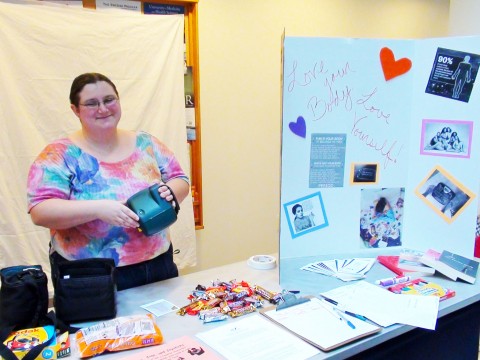
Mental illness is a tricky subject; it’s an unpleasant issue that nobody likes to talk about, and the prevalent attitude toward it seems to be one of ignorance. If we want to help eradicate the issues surrounding mental illness awareness, talking about it is exactly what needs to be done.
Conn’s Mental Health Fair in Cro on Friday, September 23, was a much needed forum. It was designed to raise awareness and initiate conversation about mental illness and the myriad misconceptions that surround mental health today, not just to provide an adorable doggy assembly.
Mental illness is a serious issue that affects all of us, and yet it receives much less attention than other hot-button issues such as sexual assault or drug and alcohol abuse. As the Active Minds booth pointed out, one in four people are affected by mental illness. Next time you’re sitting in Harris, look at the person sitting to your left, the person on your right, and the person sitting across the table. At some point, one of them will most likely be affected by a mental illness or disorder.
What does the average person know about mental disorders? The term “mental disorder” can refer to something like eating disorders or depression to like bipolar disorder or schizophrenia. Few people are aware of these stark distinctions between major and minor illnesses. Many mental disorders are very treatable and can in some cases even be cured. Having a mental disorder does not make you crazy, just in need of some help or counseling.
The keynote speaker of Friday’s Common Hour Talk, Charles Morse, the Assistant Dean of Student Development at Worcester Polytechnic Institute, made some very keen insights; Morse said that “Our society has a way of thinking about people with mental disorders as ‘us’ and ‘them’, but it’s just not true.” He went on to point out that something like depression is classified as a mental disorder, but it is also a very common emotion.
“People can get depressed about things all the time, but that doesn’t mean that they are sick people,” Morse remarked.
Morse was invited to speak at the Mental Health Fair because of the work he has done at WPI. He started and developed a program there designed to educate students about mental illness and train them to help others who are affected by it. It involves a six-week training program in which students learn the facts about issues common to college campuses like substance dependence and depression, just to name a couple. In doing so it has created an entire network of students who are not only more aware of people affected by mental illness but are also prepared to help people deal with these issues.
Morse says that he has seen a huge surge of interest in his program among the student body, and has had an increase in students visiting his office looking for help, something very crucial to fighting mental illness.
After the Friday’s Mental Health Fair, hopefully Conn will experience something similar. As Sara Kerney ’12, a psychology major and Vice President of Active Minds put it, “The turnout to today’s mental health and wellness fair was very encouraging. It shows that a lot of people are passionate about these issues at Conn. The events today are going to serve as a great way to open up the conversation about mental health on campus.”
Whether we like to talk about it or not, the fact is that mental illness is all around us. We can’t pretend it doesn’t exist. By starting the conversation and becoming involved, we can all help fight mental illness and raise awareness about a very serious issue. •









